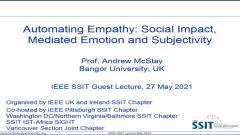This SSIT Guest Lecture was presented by Ning Wang, IBME, University of Zurich, Switzerland at a Joint Chapter Meeting organised by IEEE UK and Ireland SSIT Chapter and co-hosted by IEEE Pittsburgh SSIT Chapter, IEEE Vancouver Section Joint SSIT Chapter and SSIT IST-Africa SIGHT on 29 April 2021.
Focus
Emerging technologies are widely used in humanitarian, development and healthcare settings by aid agencies globally. Many of these solutions involve the use of digital technologies, such as geographic information systems, smartphone apps, predictive algorithms, blockchain, artificial intelligence, and unmanned aerial vehicles, also known as drones. The latter represents the first wave of robotic technology applied in the aid sector, demonstrating its remarkable capacity to speed up humanitarian responses and to optimize aid supply operations. However, along with enthusiasm comes uncertainty. Technological innovation intersects with values, norms, beliefs and various moral commitments. In the aid sector, the use of novel technology may challenge the principle of ‘Do No Harm’, may raise questions related to sovereignty, and may negatively affect equality and access for at-risk populations in disaster zones and remote areas lacking sufficient healthcare services. Additionally, humanitarian innovation may also disrupt relationships between various actors including introducing new players (e.g., private for-profit companies and networks of digital volunteers), may widen or narrow inequality between those with access and those without, and may lower or raise security and privacy risks disproportionately affecting the already vulnerable.
This lecture is informed by a research project on the ethical considerations associated with the humanitarian use of drones. The findings are based on two recent field studies conducted in Nepal and Malawi, during 2019-2020, around two main applications – disaster mapping and medical supply delivery. The lecture will focus on the Malawi study with the expectation to inform the community on the gaps and needs with respect to the ethical challenges that humanitarian innovation may invoke in the case of the so-called “good” drones.
 Cart
Cart Create Account
Create Account Sign In
Sign In




